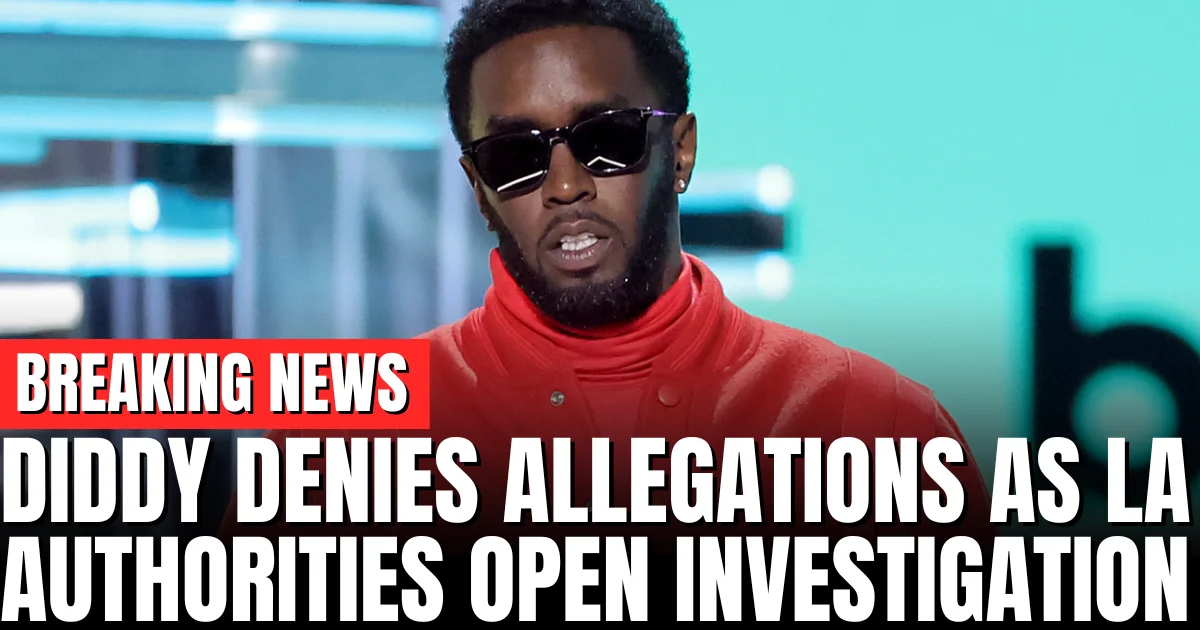Sean ‘Diddy’ Combs denies sexual battery allegations as Los Angeles authorities launch investigation. Legal process, rights, and what happens next explained.
Table of Contents
Sean ‘Diddy’ Combs Denies Sexual Battery Allegations as Los Angeles Authorities Open Investigation
Music mogul Sean “Diddy” Combs has issued a firm denial following allegations of sexual battery that prompted Los Angeles law enforcement to open an official investigation. The high-profile case raises questions about legal processes, due process rights, and accountability in cases involving prominent figures.
Combs’ legal team released statements characterizing the allegations as false while authorities proceed with standard investigative protocols. The situation unfolds amid broader cultural conversations about power dynamics, credibility, and justice system responses to serious accusations.
Details of the Allegations and Investigation
Los Angeles authorities confirmed opening an investigation following a formal complaint alleging sexual battery. Law enforcement officials provided limited public details while investigative procedures remain ongoing.
The complaint was filed through proper legal channels, triggering mandatory investigative responses from authorities. Detectives assigned to the case follow established protocols for examining allegations of this nature.
Standard investigation procedures include:
- Interviewing the complainant to document allegations thoroughly
- Gathering any physical evidence that may exist
- Identifying and interviewing potential witnesses
- Reviewing relevant documentation and communications
- Consulting with prosecutors about potential charges
- Respecting confidentiality requirements during active investigations
Authorities emphasized that investigations proceed based on evidence rather than public pressure or celebrity status. The legal system provides mechanisms designed to determine facts objectively through established procedures.
Combs’ Denial and Legal Response
Sean Combs, through his legal representatives, issued categorical denials of the allegations. His defense team characterized the claims as completely false and lacking factual basis.
Defense statement highlights:
Legal counsel emphasized Combs’ commitment to cooperating fully with investigative processes while maintaining his innocence. The defense team expressed confidence that thorough investigation will clear their client.
Attorneys highlighted Combs’ decades-long career without similar allegations, suggesting the current claims lack credibility. They positioned the denial within broader concerns about false accusations affecting public figures.
The legal team indicated readiness to provide evidence contradicting allegations and supporting Combs’ version of events. Defense strategies in high-profile cases often involve proactive information sharing with investigators.
Legal representation approach:
Experienced criminal defense attorneys typically advise clients to avoid public statements beyond formal denials during active investigations. Detailed responses come through proper legal channels rather than media engagement.
Defense teams gather their own evidence including witness statements, communications, and documentation establishing alternative narratives. This parallel investigation helps attorneys prepare comprehensive responses to allegations.
Public relations considerations intertwine with legal strategy in high-profile cases. Reputation management becomes crucial even before any charges are filed or legal proceedings begin.
Legal Standards and Burden of Proof
American criminal justice operates under foundational principles including presumption of innocence and prosecution’s burden of proving guilt beyond reasonable doubt.
Key legal principles:
Presumption of Innocence
Accused individuals are legally presumed innocent until proven guilty through proper judicial processes. This fundamental right applies regardless of accusation severity or public opinion.
Burden of Proof
Prosecutors must prove allegations beyond reasonable doubt, the highest standard in American law. This demanding threshold protects against wrongful convictions based on insufficient evidence.
Due Process Rights
Constitutional protections ensure fair treatment throughout investigative and judicial processes. These rights include legal representation, confronting accusers, and presenting defense evidence.
Credibility Assessments
Fact-finders evaluate witness credibility based on consistency, corroboration, and plausibility. Both accusers and accused receive credibility evaluations through legal processes.
Investigation Timeline and Process
Sexual battery investigations follow specific protocols designed to gather comprehensive evidence while respecting all parties’ rights.
Typical investigative stages:
Initial Report and Assessment
Law enforcement receives complaints, conducts preliminary assessments, and determines appropriate investigative responses. Serious allegations trigger immediate attention from specialized units.
Evidence Collection
Investigators gather physical evidence, documentation, communications, and witness statements. Time sensitivity affects certain evidence types, making prompt reporting important.
Forensic Analysis
When applicable, scientific testing of physical evidence occurs through accredited laboratories. Results can support or contradict allegations depending on findings.
Witness Interviews
Detectives interview complainants, accused individuals, and witnesses who might possess relevant information. Interview techniques vary based on each person’s role and relationship to allegations.
Prosecutorial Review
District attorneys examine evidence to determine whether charges are legally and factually warranted. This evaluation considers provability beyond reasonable doubt, not just whether allegations seem credible.
Challenges in High-Profile Cases
Celebrity involvement creates unique complications affecting investigations, prosecutions, and public perceptions.
Specific challenges:
Media Attention
Intense publicity can influence witness memories, create jury pool contamination, and pressure all parties involved. Courts sometimes implement protective orders limiting public disclosures.
Resource Disparities
Wealthy defendants access top legal talent and investigative resources unavailable to typical accused individuals. This creates perceived and actual justice system inequalities.
Public Pressure
Social media campaigns and advocacy groups sometimes demand specific outcomes before investigations complete. This pressure can affect prosecutorial decisions and jury selection.
Credibility Assumptions
Celebrity status influences credibility perceptions in conflicting directions. Some assume power enables misconduct while others suspect accusers seek financial gain or attention.
Legal Representation Importance
Both accusers and accused benefit from experienced legal counsel navigating complex criminal justice systems.
Why attorneys matter:
Lawyers ensure clients understand their rights and available options throughout legal processes. Many individuals lack familiarity with criminal justice procedures and requirements.
Attorneys communicate with law enforcement and prosecutors, protecting clients from self-incrimination while facilitating appropriate cooperation. Strategic decisions about what information to share require professional judgment.
Legal counsel identifies procedural violations, evidentiary problems, and constitutional rights infringements that laypeople miss. These issues can prove decisive in case outcomes.
Potential Outcomes
Investigations can conclude in various ways depending on evidence gathered and legal assessments.
Possible resolutions:
No Charges Filed
Prosecutors may determine evidence insufficient to prove allegations beyond reasonable doubt. This represents the most common outcome in many investigated allegations.
Criminal Charges
If evidence supports allegations sufficiently, prosecutors file formal charges initiating criminal proceedings. Accused individuals then face arraignment, potential trial, and possible conviction.
Civil Litigation
Regardless of criminal case outcomes, accusers can pursue civil lawsuits seeking financial damages. Civil cases use lower proof standards than criminal prosecutions.
Settlement Agreements
Parties sometimes resolve disputes through negotiated settlements involving financial payments and non-disclosure agreements. These often occur in civil rather than criminal contexts.
Broader Cultural Context
This case emerges within ongoing societal conversations about power, accountability, and justice system responses to allegations of sexual misconduct.
The #MeToo movement changed public discourse around credibility, with greater emphasis on believing accusers and reducing barriers to reporting. These cultural shifts influence how allegations are received publicly if not legally.
Simultaneously, concerns about false accusations and due process protections remain important. Balancing support for legitimate accusers with rights of accused individuals presents ongoing challenges.
Systemic considerations:
Many allegations never receive official reports due to fears about credibility challenges, retaliation, and traumatic legal processes. Low reporting rates complicate understanding actual misconduct prevalence.
Power differentials in entertainment and other industries can enable misconduct while discouraging victims from coming forward. Structural reforms aim to address these enabling environments.
False allegations, while statistically rare, do occur and can devastate innocent individuals. Justice systems must distinguish legitimate claims from fabricated ones through careful evidence evaluation.
What Happens Next
The investigation will proceed according to established protocols regardless of public attention or speculation.
Investigators continue gathering evidence and conducting interviews. This process typically takes weeks or months depending on case complexity and evidence availability.
Prosecutors will eventually decide whether evidence supports criminal charges. This determination involves legal sufficiency assessments separate from public opinion or political considerations.
If charges are filed, court proceedings follow with arraignment, discovery, potential motions, and possibly trial. Criminal cases can take years from initial charges to final resolution.
Regardless of criminal case outcomes, civil litigation possibilities remain. Accusers can pursue damages through lawsuits with different evidentiary standards than criminal prosecutions.
FAQ SECTION
1. What is sexual battery under California law?
California law defines sexual battery as touching an intimate part of another person for sexual arousal, gratification, or abuse against that person’s will. The offense can be charged as either a misdemeanor or felony depending on circumstances including use of force, victim vulnerability, and other factors. Conviction carries potential imprisonment, fines, and mandatory sex offender registration depending on specific charges and case details.
2. What does it mean when someone denies allegations?
When accused individuals deny allegations, they formally assert that claims against them are false or inaccurate. Denials represent the accused person’s version of events and invoke their legal right to challenge accusations. Under American law, denials place the burden on prosecutors to prove allegations beyond reasonable doubt rather than requiring accused individuals to prove innocence.
3. How long do criminal investigations typically take?
Investigation timelines vary significantly based on case complexity, evidence availability, witness cooperation, and resource allocation. Simple cases might conclude within weeks while complex investigations involving multiple witnesses, forensic evidence, and extensive documentation can take months or years. Statute of limitations laws set maximum timeframes for filing charges after alleged incidents occur.
4. What happens if prosecutors don’t file charges?
When prosecutors decline to file criminal charges, no criminal case proceeds through courts. This decision typically reflects insufficient evidence to prove allegations beyond reasonable doubt rather than determinations about what actually occurred. Accusers retain options to pursue civil lawsuits seeking damages under lower proof standards. Investigation closures without charges don’t prevent future charges if new evidence emerges within statute of limitations periods.
5. Can someone be guilty in civil court but not criminal court?
Yes, civil and criminal cases use different proof standards. Criminal convictions require proof beyond reasonable doubt while civil cases need only preponderance of evidence (more likely than not). This explains situations where criminal charges fail but civil juries find liability. The O.J. Simpson case famously demonstrated this distinction with criminal acquittal followed by civil liability findings.
CONCLUSION
The investigation into allegations against Sean “Diddy” Combs demonstrates how the criminal justice system handles serious accusations involving high-profile individuals. Los Angeles authorities follow established protocols while respecting both accusers’ rights to be heard and the accused’s constitutional protections.
As this case proceeds, legal processes rather than public opinion or celebrity status should determine outcomes. The justice system provides mechanisms designed to establish facts objectively through evidence evaluation and proper procedures.
Whether investigations lead to charges or closures, the case highlights ongoing challenges in balancing support for accusers with due process rights for accused individuals. These competing interests require careful navigation to achieve justice for all parties involved.
The legal system must handle all allegations seriously while respecting presumption of innocence. What reforms might improve how justice systems address these difficult cases? Share respectful thoughts in the comments.

